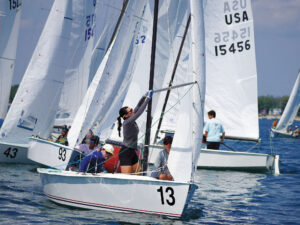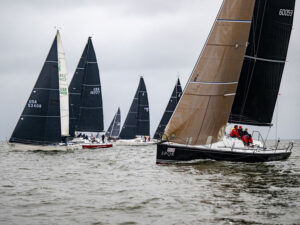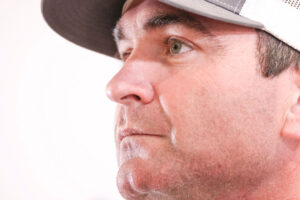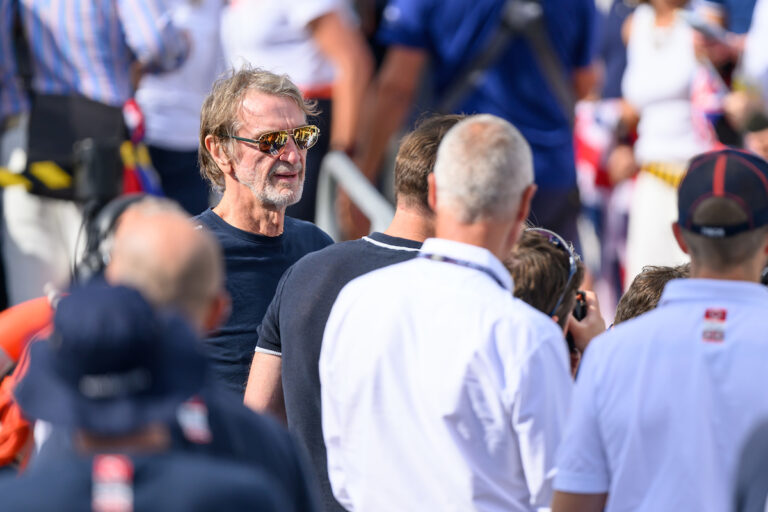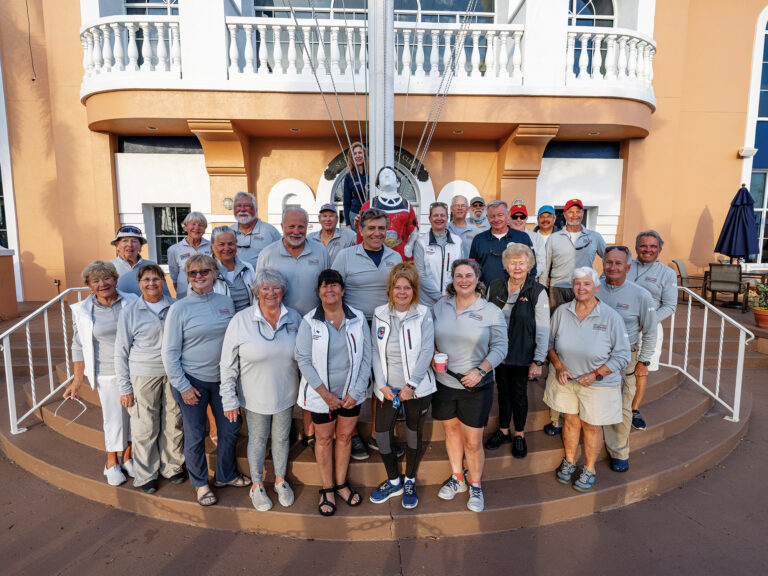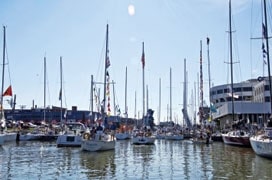
LakeEffect1
“Sorry, JoJo,” I say, “We have to get the heavy No. 1 up now.” Joanne Tiborcz, the tireless bowman on Fran and Gerry Anderson’s Beneteau First 40.7 Bushwacker, jumps off the rail with a grin and chirps: “No problem.”
Then I finish the thought: “But you have to go up the rig and clear the halyards first.” To her credit, the Canadian sailor doesn’t even pause, and tightens her Petzl harness as if it were our first sail change of the day, not the 25th. If I needed any further reinforcement of the premise that the Bacardi Bayview-Mac is every bit as challenging as any ocean race I’ve ever done, this second day of racing is it.
Yet, my first inkling that Bayview YC’s Mackinac Race is unique came two days earlier: I roll through the outskirts of Port Huron, past a liquor store with a huge banner. “Welcome Race Fans!” it read. I wonder aloud if there’s a NASCAR race nearby. “Nope,” says Walter Cooper, yachting photographer and Port Huron native. “It’s for the Mac.”
By the time we reach the banks of Port Huron’s Black River, where most of the 244 entries in the 2006 Bayview-Mac sit waiting for the next day’s start, it’s clear that, unlike most yacht races, the general population is actually interested in what’s going on. Radio and television stations have booths and vehicles stationed at vantage points near, or on, the docks lining the river. Crowds of people stroll by, looking at the boats and asking the questions non-sailors ask. “What happens at night? Do you pull over and sleep?” On a large powerboat draped with a local radio station’s banners, a disc jockey emcees a beauty contest. Amidst this shoreside circus, crews load stores and sails.
It was 1925 when Bayview Yacht Club held the first Bayview-Mac. It’s remembered as a stormy affair, with only four of 12 entries finishing the race. It’s easy to see why Bayview chose Mackinac Island, it’s a charming place, and relatively unchanged since 1925. Horse-drawn carriages and bicycles are the only modes of transportation on the 3.77-square-mile island. Victorian homes stand at the end of sweeping green lawns and overlook the Mackinac Strait where lakes Michigan and Huron meet. And as the first Mac racers learned, the island isn’t that easy to get to, but getting there is worth the effort.
On the day of the race, the weather gods beamed benignly on the fleet. During an early morning weather briefing, skippers and navigators are shown a slide composed of two images that illustrate what the briefer believes the weather won’t do during the race. On one side, a parking lot full of cars, on the other, a satellite photo of a particularly well-formed hurricane. Our race, said the briefer, will be neither a drifter, nor very windy. For Bushwacker, and a lot of the rest of the fleet, it was a bit of both.
On board the MaxZ86 Windquest, America’s Cup bowman Geordie Shaver is convinced this year’s race will be light. Bill Alcott’s Equation took ownership of the race record the year before, taking 25 hours and change to sail the 253-nautical mile Southampton Course, but the entire race was windy. Most of the Windquest crew is excited about the boat’s capabilities, but Shaver doubts Alcott’s record will fall. “If we break Equation’s record,” he said, “I’ll stand on the bar at the Pink Pony [where racers gather on Mackinac Island] and shave my head.”
As the briefing carries on, thousands of spectators line both sides of the Black River. Seated in lawn chairs, standing on the porches of bars and restaurants, and riding in powerboats, the crowd is there to see the boats head out to the racecourse. One trio of elderly women holds up number cards, ranking crew uniforms as boats pass by. As we motor by the packed Port Huron YC, we’re serenaded by a band of kilt-wearing bagpipers.
Light air plagues the fleet during the first few hours after the start. We’re able to keep the boat rolling and are the second boat in our class around the race’s only turning mark, the NGS buoy off Canada, about 99 miles from the start and 15 hours into the race. As we round, Lake Huron decides to throw hammers at us. The wind pipes up, and waves come at us from three different directions. An ominous dark cloud appears to our south, and as it approaches, the wind disappears completely, then blows hard from the north, then clocks, then backs, then goes down to zero, then up to 28 knots. At one point I take a break from steering and look at the scene around us. Some boats carry spinnakers in light air, others have storm jibs and reefed mains and are on their ears. If Escher had drawn yacht races, they’d look like this.
Our bow team deals with whatever sail changes we throw at them with aplomb. Spinnaker, light headsail, small jib; we rotate through the inventory many times. By afternoon, as the wind moderates, everyone is burned-out. Our skipper, Fran, has a cast on her arm from her fingers to her upper arm that prevent her from steering, but she manages to keep the rest of us full of food and drink. Everything’s looking good; the crew is working well together, we haven’t broken anything, and if the breeze stays up, we might make it to Mackinac early the next morning.
When it comes to distance racing, I’m superstitious. Even if I’m navigating, I won’t give an estimate of when we’ll be finished. It’s just asking for trouble. At some point during Sunday afternoon, as we’re romping along, someone utters the words I won’t. Late that day the wind dies for a long, long time. Most everyone goes to sleep and the wind gets so light we talk seriously about taking down the main to allow uninterrupted flow to the spinnaker. The leftover chop from the day’s stronger breezes makes steering difficult, but it gets worse, as a swarm of biting flies takes up residence on board. By sunset, the wind drops even more; I drive the boat with one hand clutching the wheel and the other a fly swatter. At about 80 miles from the finish line, our GPS estimates we’ll finish in four days.
At around the same time, the shears are whirring inside the Pink Pony, and Shaver’s hair is floating. Thanks to breezy conditions on its part of the racecourse, Windquest has taken one hour and 12 minutes off Equation‘s record of 25h:29m. “We were looking at a forecast of zero to seven knots,” says Shaver days later. “The guys were all mumbling ‘record pace, record pace’ the night before and during the morning of the race they were still carrying on. I was confident we wouldn’t break the record. I was wrong.”
It’s a long night on Bushwacker. The flies render the cabin unfit for sleeping. Fran and Gerry have more than 50 Mac races between the two of them and are able to sleep while wrapped head-to-toe in sheets. By sunrise Monday, we’re all knackered, but we’ve wriggled our way to within 30 miles of Mackinac. The smell of pine forests fills the air, and as the sun rises, so does the wind.
As we approach the Straits under a small headsail and full main, and with everyone on the rail hiking, we begin to see more and more boats, including ones sailing the 204-mile Shore Course. We all tight reach our way past Bois Blanc Island, and as we round a small point, we can see the bluffs on Mackinac Island and the lighthouse that marks its southern end. The sky is clear, the water an impossibly beautiful blue, and Mackinac’s pleasures await us.
We finish just shy of 9 a.m. and head for docks already packed with boats. When we tie up on the outside of a five-boat raft, next to the C&C 41 Titan, we’re in second. By the time we have our first beer, we’re in third, and then fourth, as smaller boats in our class rumble in. By the time I check into my hotel and take a shower, we’ve dropped to sixth in our nine-boat IRC E class, and we stay there.
The disappointment of our finish fades by the time our crew rendezvous at the Pink Pony. It seems as if every sailor in the fleet is there, and the scene is a chaotic mishmash of shouting, bar karate, tall tales, and spilled beer. The Titan crew, which was cautiously optimistic that morning, has confirmed its class win, and swarms the bar for a high-decibel celebration. It’s the team’s first win in a decades-long chase for silver.
“We started hearing boats calling in, and the first one was Epic,” says Dan Aitken, one of Titan‘s three co-skippers, who marked his 29th Mac Race this year [his co-skippers Ernie Dumouchelle and Mike Schultes have sailed 33 and 32 Macs, respectively]. “They called in just ahead of us and we realized she’d started before us, and is a fast boat. We said ‘Wow, we may have done OK.’ The mood on the boat after we got in was kind of quiet, we were a little numb, but we had a good time that night. The sailors who win always say they’re more lucky than good, and this year, I believe that.”
The next morning I join the hundreds of people gathering on a huge, grassy field with bars dotted around its periphery. Most of the staff from Bayview YC has traveled to Mackinac to put on the awards ceremony, even executive bartender Jerome Adam, a living Bayview YC legend. Sailors who’d bayed at the moon the night before push strollers loaded with babies and sippy cups slowly through the crowd. “It’s the hype and excitement,” says Aitken, explaining the lure of the Bayview-Mac. “It’s the beautiful fresh water, the excitement of competing, and the camaraderie. It’s the high point of the summer.”
Aitken also gives me the final bit of information that cements the idea in my mind that the Bayview Mac race is special. “When my daughter heard we’d won,” he says, “she walked into her boss’s office and said, ‘My dad just won the Mackinac Race.’ He said, ‘Well, you’d better get going on up to the island.'”

